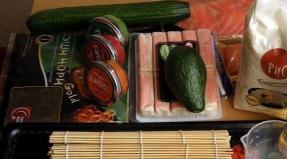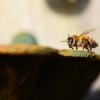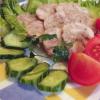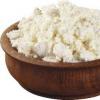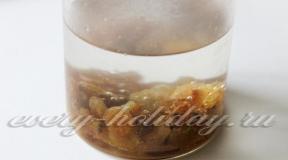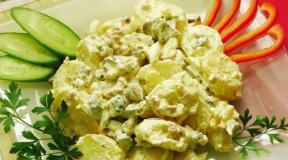How to store vegetables and fruits properly. What to keep in the refrigerator and at room temperature
Ecology of consumption: Ripe vegetables and fruits are famous for the highest vitamin content. But how do you know if a banana is ripe or, for example, a pineapple?
Ripe vegetables and fruits are famous for the highest vitamin content. But how do you know if a banana is ripe or, for example, a pineapple? Good indicators in such cases are the color and smell of a particular vegetable or fruit. Naturally, no one would come up with the idea of peeling a banana and taking a bite. It is even harder with pineapple: by its appearance it is hardly possible to determine whether it is yellow, or even green. And here the smell will help us: if the pineapple exudes a typical aroma, then it is ripe. The smell determines the ripeness of other fruits, for example, honey melon, mango.
What happens with long-term and improper storage?
Improper storage of vegetables and fruits destroys vitamins, which are very sensitive to changes in temperature and light. The pulp of the fruit deteriorates, the fruit itself becomes nondescript and inedible. So, for example, when storing a banana in the refrigerator, like many tropical fruits that are not used to low temperatures, it loses its taste and aroma. The best solution in this case is to store them at room temperature.
What can and cannot be stored in the refrigerator?
You can store in the refrigerator:
Fruits: apples, apricots, pears, strawberries, figs, cherries, kiwi, nectarine, plums, peaches, table grapes.
Vegetables: artichoke, lettuce, cauliflower, broccoli, carrots, cabbage, radishes, Brussels sprouts, red beets, celery, asparagus, spinach
Can't be refrigerated:
Fruits: pineapple, avocado, banana, pomegranate, mango, papaya, citrus, melon. Vegetables: eggplant, cucumber, green beans, potatoes, pumpkin, peppers, tomatoes, zucchini.
What does "correct storage" mean?
Previously, every house had a cellar and storage room. It was always cool and dark there, which in itself is an ideal place to store vegetables and fruits. Today, we have at our disposal only a refrigerator.
Those who do not have a cellar should pay attention to the fact that vegetables and fruits cannot be stored in warm and bright rooms. Whatever it was, but in every apartment there is a corner, cooler and darker than the rest.
Store your vegetables and fruits there. But apples are always separate, because they release ethylene, which causes the rest of the fruits to overripe.
The following vegetables and fruits are sensitive to the most important ripening hormone - ethylene:
Very high sensitivity to ethylene in kiwi, honeydew, mango, broccoli, cauliflower, cabbage and Brussels sprouts.
High sensitivity in apricots, bananas, pears, nectarines, peaches, papaya, avocado, cucumbers, tomatoes.
Medium sensitivity in citrus fruits, leafy vegetables, potatoes, paprika, mushrooms, onions. Always store apples separately!
What to do with unripe vegetables and fruits?
Some fruits are harvested fully ripe, while others are still green. For example, such southern fruits as bananas are harvested green in order to bring them in a marketable form to our northern latitudes. They ripen on the way and at vegetable bases. Some domestic fruits, such as tomatoes and apples, are harvested and sold unripe. Half green, unripe tomatoes ripen well in clay pots.
Fruits that ripen:
apples, apricots, avocados, bananas, pears, blueberries, figs, guayava, kiwi, mango, nectarine, papaya, peaches, plums, tomatoes, watermelons.
Fruits that do not ripen:
pineapples, raspberries, strawberries, blackberries, cherries, tangerines, grapes, citrus fruits, eggplants, cucumbers, paprika.
What to do with brown spots?
It often happens that brown spots appear on the fruits even in supermarkets. This means that the fetal tissue is damaged. Such fruits contain much less vitamins than healthy ones. Therefore, when buying, you need to carefully consider the product. If you notice such dark spots in home vegetables and fruits, which appeared as a result of stagnation, they must be cut out, and the rest of the fruit should be used as usual.
And I would also like to give some advice regarding the winter storage of vegetables and fruits. In the conditions of modern buildings, it is sometimes quite problematic to properly keep fresh vegetables and fruits throughout the winter. The warm and dry basements of modern homes are wrapped in an airtight concrete corset. Therefore, observing certain conditions, the autumn harvest can still be kept fresh and edible until the end of winter.
A wooden box filled with sand is suitable for storing all root vegetables. The sand must be wet!
The boxes of potatoes should be stored in a dark room (potatoes will germinate in the light). Store separately from apples. Apples produce a germinating substance for potatoes.
Store apples and pears in wooden crates or wooden trellises in a cool, well-ventilated area. Cover them with a damp cloth to stop evaporation. The fruit will retain its aroma for a long time and will not wrinkle so quickly.
How to store fruits and vegetables Store cereals in wooden boxes or paper bags, shake them from time to time.
Vegetables and fruits can be dried in a tumble dryer or oven. Dried vegetables and fruits should be stored in a dry, well-ventilated place.
Dry, well-ventilated areas are suitable for drying onions and garlic on a string. Bushes with unripe tomatoes, herbs, flowers should be stored in a dry place and suspended. published
0
There is nothing difficult in the correct storage of fruits, the main thing is to follow some basic rules. They consist of the following points:
- fruit quality;
- suitable storage space;
- purity;
- separate content.
Good quality fruit is one of the most important components for the long-term preservation of fruit. The fruit must be picked by hand and must not be rotten or damaged.
 A well-ventilated, cool room, protected from rodents and insects, is an absolutely suitable place for storing fruit. Ideal if it will be a cellar, basement or garage.
A well-ventilated, cool room, protected from rodents and insects, is an absolutely suitable place for storing fruit. Ideal if it will be a cellar, basement or garage.
In addition, humidity is of great importance, which should ideally be around 80%. The most suitable temperature in winter is between 1 and 4 ° C, in spring and summer it should not exceed 12 ° C. The fruits should not freeze, because in this case they will lose vitamins, as well as taste and smell.
The cleanliness of the room is a matter of course. If this is a cellar or basement, then it is advisable to disinfect and whitewash the walls. Wash and dry the shelves and containers in which the food will be stored.
It is good if the fruit boxes are sealed, but do not forget about their need for regular ventilation.
Separate storage is very important for some types of fruits, especially apples and pears, as they readily accept other odors. Moreover, apples release ethylene, which leads to accelerated ripening of other fruits. Some fruits, such as bananas, can easily spoil other fruits.
Where can you store fresh fruit?
In the dry zone, the room temperature reaches about 18-20 ° C with a characteristic low humidity. At home, fruits are most often stored on shelves in kitchen cabinets or in the closet. This is the perfect place for dried fruit, but fresh fruit won't last long.
The cold zone is a room with a temperature of 12 ° C and slightly high humidity. This could be, for example, a basement. It is great for storing fruit and vegetables alike.
If you do not have a basement at home, then the fruits can be stored on the balcony.
The refrigerated zone is a refrigerator, the temperature in which must be in the range from 0 to 5 ° C. Here is the best place for those fruits that you are going to process into compote or consume within a few days. The coldest storage area for fruit is the freezer. Frozen fruits can lie in it for a very long time, but to the detriment of their beneficial properties.
In the fridge
 Today, almost every home has a refrigerator. With the advent of this unit, we have long forgotten that some products can be stored outside the refrigerator. Moreover, some types of fruits categorically do not tolerate cold. For example, citrus fruits, bananas and all tropical fruits cannot be stored in it.
Today, almost every home has a refrigerator. With the advent of this unit, we have long forgotten that some products can be stored outside the refrigerator. Moreover, some types of fruits categorically do not tolerate cold. For example, citrus fruits, bananas and all tropical fruits cannot be stored in it.
It is best to put fruits there that you did not eat the day before and are going to do it in the near future. It is better to put too ripe fruits in the refrigerator, because only he can save them.
Of the frost-resistant fruits, strawberries can be noted, they are not afraid of frost and therefore the refrigerator will be the most comfortable place to store them. The berry can lie there for several days, packed in small baskets. It is best to divide the strawberries into several pieces to prevent spoilage.
In addition to strawberries, you can store fruits such as apples, grapes, ripe pears in the refrigerator. In this case, the lower temperature limit should not be lower than 8 ° С, and the upper one should not be higher than 13 ° С. Sweet cherries, cherries, raspberries, currants, blackberries, blueberries and other berries can lie on the topmost shelf for no more than two to three days.
On the kitchen
 The most popular fruit today is the apple. It can be seen on the table in almost any home. This fruit is ideally stored on clean wooden shelves so that the fruits do not come into contact with each other. Leave a small space for air between the containers. This will allow the apple to ripen faster.
The most popular fruit today is the apple. It can be seen on the table in almost any home. This fruit is ideally stored on clean wooden shelves so that the fruits do not come into contact with each other. Leave a small space for air between the containers. This will allow the apple to ripen faster.
The storage area should not be heavily ventilated, as the fruit will dry out quickly.
Pears can be preserved in the same way as apples. Citrus fruits - lemons, oranges, grapefruits and others stay relatively fresh for a long time when wrapped in newspaper, placed in a box, and stored in a cool and dark place.
How to store fruit properly at home
How to keep unripe fruits at home
For many fruit growers and traders, the favorite is often the one that is able to ripen outside natural conditions without losing taste and quality. These fruits include apples, bananas, and pears. Some fruits can also ripen at home, but their taste will differ significantly from those that ripen on a tree. This applies to pineapples, apricots, peaches and nectarines.
It is advisable to buy plums extremely ripe, since, most often, they do not ripen at home and remain unripe.
Unripe peaches should be stored at room temperature for 2 weeks to a month, depending on ripeness.
How much and at what temperature can exotic fruits be stored
 Exotic fruits are usually bought unripe and left to ripen at home. How long the fruit will take to ripen depends on the conditions in which it will be stored. Their ripening can be accelerated by the apple, which secretes a special substance.
Exotic fruits are usually bought unripe and left to ripen at home. How long the fruit will take to ripen depends on the conditions in which it will be stored. Their ripening can be accelerated by the apple, which secretes a special substance.
Simply put an avocado or mango in a paper bag along with an apple and leave it at room temperature for a few days. Pineapple ripens within 2-3 days.
The uneaten fruit must be wrapped in plastic wrap and refrigerated for a maximum of 2 days.
Do not store bananas in the refrigerator under any circumstances; the temperature for ripening and storing them should not be lower than 14 ° C. If the fruit is stored at low temperatures, it will negatively affect its taste and texture. You will recognize a ripe banana by its characteristic brown spots on the peel, which indicates the presence of fructose. Unripe bananas are difficult to digest and have a starchy taste.
Dried fruits
If you regularly consume dried fruits, then you should know that they have special conditions for proper storage. The most important thing for this product is moisture and warmth. Therefore, it is best to store dried fruits in a dry place at temperatures no higher than 10-12 ° C.
If you have stocked up with a lot of drying, then it must be rinsed and dried again in the oven. This will help avoid the risk of mold, which affects mostly under-dried fruit. Choose a special container for storing the product. Glass jars or cotton pouches work best. Don't forget about storage times. Dried fruits cannot be stored for more than a year.
 In the fall, it's time to think about how to preserve fruit and stock up on a dose of vitamins for the winter. The most common ways are:
In the fall, it's time to think about how to preserve fruit and stock up on a dose of vitamins for the winter. The most common ways are:
- Freezing.
This method is widespread not only in our country, but also in the USA, where 20 million families resort to freezing fruits without fear of losing their nutritional value;
- Canning.
This is a convenient and not very complicated process. In order to preserve your favorite fruits with high quality and tasty, you just need to follow certain rules;
- Drying.
Although the fruit loses some vitamins, flavor and color during this process, it is one of the most popular ways to preserve fruit.
- Do not wash fruit before placing it in the refrigerator.
- Remember, not all foods need to be stored in a cold place to keep them fresh longer.
- If fruits are wrapped in plastic wrap, their shelf life will increase significantly.
- It is better to eat such healthy fruits as grapes right away.
Regardless of the season, you can buy almost any fruit and vegetable in the shops. And in order for these products to retain their presentation, freshness and maximum vitamins, you need to adhere to the rules for their storage. In this article, I will share with you the experience of storing vegetables and fruits in the refrigerator, pantry and on the balcony, as well as tell and show you little tricks that help protect food from spoilage.
To prevent vegetables and fruits from absorbing the smell of each other, they should be stored separately (on different shelves of the refrigerator, in special containers, boxes, bags, etc.).
Potato
Store potatoes in a cool, dark place with good air circulation. And to prevent sprouts from appearing on the tubers, put 2-3 apples in a bag or box with potatoes. The apple absorbs moisture faster and the potatoes will not sprout. My potatoes are stored on the balcony in a plywood box, insulated with foam. When there are severe frosts outside the window, I cover the box with a sheepskin coat.
It is undesirable to store potatoes in the refrigerator, because moisture and cold negatively affect the taste of the tubers.

Pumpkin
I also keep the pumpkin on the balcony. I have it insulated, and the temperature during a not too cold winter is kept within 10-12 degrees. I covered the floor with paper, laid out the pumpkin and covered it with a dark blanket. After all, it is desirable to store it in a dark place, where direct sunlight does not fall. But since January of this year turned out to be very frosty, I moved the pumpkin into the room and placed it in the corner near the balcony, of course, away from the battery. If I left the pumpkin on the balcony, where the temperature dropped to 0-2 degrees, and maybe even lower, the orange beauty would begin to turn black and rot.

Cabbage
I store white and blue cabbage in a cool place, wrapping the cabbage in paper. I don't remember where I heard this advice, but I liked the fact that it almost does not deteriorate (the top leaves dry out a little). And so that it does not take up much space in the refrigerator, I fold it on the balcony, wrapping each head of cabbage in paper. Do not use newspapers, paint from printing can be absorbed into the vegetable, and it is very dangerous to use such products.

Onion
I store onions of different varieties (Yalta or red, shallots, onions) separately from each other. The room should be dark, dry and cool (temperature not higher than 18 degrees). For the onions, I have a separate large basket, it is well ventilated, and I can always quickly select the right onion size. I'm not a fan of hanging a bow in nylon tights or nets, it's not very convenient to get it out of there. These baskets are in my pantry.

Hot peppers
In the pantry, in addition to onions, I store red hot peppers. I hang it on a string on a nail. Doesn't bother anyone, hangs and dries.
Roots
In the refrigerator in the vegetable compartment, I store carrots, beets, celery root, horseradish root, as well as Chinese cabbage and small forks of blue and white cabbage.
 \
\
Carrot
I never my carrots, I keep the same that I dug in the garden, that is, in the ground, sand or clay. The fact is that carrots have a thin skin and, having washed the vegetable, you shorten its shelf life. Carrots are perfectly stored in the refrigerator in a plastic bag at a temperature of +2 - +5 degrees for two to three weeks.
If you have a private house, basement or cellar, then do not be too lazy to make a box of sand for the carrots and store it in it (by completely immersing the carrots in the sand; with this storage, the carrots, after being removed from the sand, are no different from those just dug out in the garden) ...

Beet
Beets are perfectly stored in any cool place: the bottom shelf of the refrigerator or the vegetable compartment, a balcony, a basement or a cellar. Store it in a drawer, bag, or bag. If I bought a lot of beets, then I keep some in the refrigerator, and some on the balcony. The main thing is to protect the vegetable from direct sunlight.
I store radish, celery root, horseradish root in the same way.
By the way, root crops cannot be stored cut, because they quickly deteriorate, dry out and rot. If you have half a beet, a part of a carrot or a celery root and nowhere to apply them, freeze the vegetables. Cut into cubes, strips or grate, put in a bag and send to the freezer. In the future, when boiling soup or stewing a dish, you will have a useful preparation.

Fruits and some vegetables
Apples, tomatoes and bananas, as well as pears, bell peppers, etc. should be kept separate from other vegetables. A special substance that they release, ethylene, promotes the rapid ripening of other vegetables and fruits, and this can lead to food spoilage.

Bananas
Therefore, I keep bananas in a basket on the refrigerator. You can leave them on the kitchen table, but having children in the house, you will quickly part with such a bundle, and so you can control the amount of fruit eaten. Do not keep bananas in a bag, they will ripen very quickly.

Apples
I store apples in a cool place. I'm more comfortable on the balcony. It is possible in the refrigerator, but then there is no room for other products. It is very convenient to store apples in a cardboard box, box or basket, separating them with ordinary paper so that rot or spoilage does not spread to other fruits. If the volume of apples is small, less than 3-4 kg, then paper may not be used.

Tomatoes
I never store tomatoes in a special compartment with other vegetables. And in general I do not put it in the refrigerator. For some reason, after lying in the refrigerator, tomatoes become tasteless. Therefore, I store them in a container with holes on the shelf of my kitchen cabinet. By the way, it's cool in my kitchen, the temperature is 18-19 degrees.
And I also do not buy a large number of tomatoes, I always try to count on a salad or in a dish so that they do not stale for a long time.

Greens
I store dill, green onions and parsley in the refrigerator, dipping the tips into a container of water. And so that the tops of the greenery did not fade, I covered them with a ventilated lid. I take a plastic bottle, cut off the neck part, unscrew the cap and cover the greens. This keeps the greens fresh for about 3-4 weeks.

Garlic
Most of the trouble I had with the storage of garlic. The fact is that until the new year, the heads of garlic are stored perfectly in the refrigerator, and on the balcony, and in the pantry. But January-February comes, and the garlic begins to sprout, the teeth wither, deteriorate and turn yellow. Whatever I've tried.
Two methods helped: burn the place of root sprouting over the burner and sprinkle the chives with salt or flour. I always have such a jar in my refrigerator - in it are chives in husks, sprinkled with flour. You can also peel the teeth, put the garlic in a jar and cover with vegetable oil. It turns out that time has already been saved for peeling the garlic, and the aromatic oil can be used for frying other products.

Cucumbers
I like to eat cucumbers cold. But many argue that they cannot be stored in the refrigerator. Yes, if stored in a closed bag, then they deteriorate faster and taste tasteless, and without a bag they quickly wither. I store them on the refrigerator door, putting them in a bag and opening it slightly so that the cucumbers can breathe. Why on the door? So this is the warmest place in the refrigerator with a temperature of about +8 degrees. This result suits me, cucumbers do not wither and do not change taste. So I have them stored for up to one week.
Don't buy more cucumbers than you planned for a salad or other dish. Cucumbers wither quickly, and it may turn out that you just wasted your money down the drain.

Lemons
Here, on the refrigerator door, I have lemons. To prevent them from spoiling, I do not put them in a bag. As you can see, the cut lemon is on my saucer, cut down. To prevent the cut from drying out, I dip the lemon in sugar and put it on a plate. And if the lemon is needed for a savory dish, then I dip it in salt and also keep it cut down on a saucer.
Most often I keep tangerines and oranges on the balcony. And when there are very few of them left, I put them on the refrigerator door without a bag.

Nuts
Something I have a lot of are nuts. We collect the harvest in bags, so we want to keep everything whole and not spoiled. The best way to store it is in a cool and ventilated place. No plastic bags, cans, plastic containers. I store it on the balcony in a box.
I also have a lot of "drying", and I have repeatedly fought with moths, which flew out of bags with dried apples. And then I began to store it in the cold and always in a linen bag, in which I put several dry sprigs of mint. The photo shows that the bag with "drying" is hanging on the balcony in the corner above the nuts.

Despite all the tips and tricks for storing fruits and vegetables, keep in mind that they are best consumed fresh when they are most healthy and tasty. Try to correctly calculate the amount of fruits and vegetables that you need within two to three weeks.
I hope my article was useful to you.
For five days, we will talk about how to equip your home, make budget repairs, deal with utility bills once and for all and find beautiful interior items. This article is about how to properly store food at home.
Vegetables and fruits
All fruits and vegetables emit ethylene, a colorless ripening gas. The more mature the plant, the more gas. The largest amount of ethylene is emitted by overripe fruits, for example, a rotting tomato. If it or a banana skin is placed in a box with unripe peaches and covered, the peaches will ripen faster than they would on their own outdoors. On an industrial scale, vegetables and fruits are placed in chambers with ethylene to accelerate ripening.
Ideally, vegetables and fruits should be stored in paper bags separately from each other: paper creates isolation, including from diseases.
Plastic bags are fine too, as long as the food is dry. If you plan on eating fruits and vegetables over the course of a few days, you don't need to keep them in the refrigerator.
Tomatoes
Whether or not to store tomatoes in the refrigerator is a controversial issue. On the one hand, when it is cold in a tomato, as in any other product, metabolic processes slow down. On the other hand, a tomato is a specific product that quickly deteriorates in the light, and withers in the cold due to its watery structure. Tomatoes were often dehydrated in older refrigerators, while new ones are made in the so-called "crying type", when moisture collects on the back wall and then drains into a special tray. Thus, the refrigerator maintains a relative humidity close to 100%, versus 75% in the past. Accordingly, you can store tomatoes in such a refrigerator. The main thing is not to forget about the expiration dates.
Potato
In the light, potatoes, like other plants of the nightshade family (for example, eggplant, tomato and pepper), begin to turn green and at the same time produce the poisonous substance solanine. It is better not to eat such potatoes or cut off the affected area on it. You need to store potatoes in a dark and cool place, at a temperature not higher than plus 2-4 degrees Celsius, otherwise it will start to sprout. Of course, ideally, potatoes should be stored in a cellar, as was done before, but a refrigerator will work too. And it is better if the tubers are in a paper bag.
Onions and garlic
In order for onions and garlic to be preserved for a long time, they must be in a cool, ventilated place, otherwise they will dry out and rot, since fungus can infect them in the heat.
Sauces
Sauces can be stored both in the refrigerator and on the kitchen table. The only problem (if this is, of course, a problem at all) is that they can thicken. But this does not mean at all that their taste or texture will be destroyed.
Honey
One of the few foods that is really best not refrigerated. This is not a living organism, such as fruits and vegetables, it does not have biochemical processes that can or should be slowed down with the help of cold. In the refrigerator, due to the low temperature, honey will crystallize and thicken.
Greens
The greens must be washed initially, including in order to separate the good from the spoiled. Next, the most important thing is to dry thoroughly. This is most conveniently done with a paper towel.
There are several ways to store greens, for example, in a glass jar closed with a plastic lid, or in a plastic bag with holes made in it to allow air to enter. In fact, it is most convenient to wrap the herbs in a damp cloth towel and put them in the refrigerator.
Tea, coffee, spices, yeast
The main task here is to limit evaporation as much as possible, as well as to buy these products in moderation, since they also cannot be stored forever. You can pour tea and spices into glass or tin cans, but make sure they are tightly closed.
As for the recently popular instant yeast, it must be stored in the freezer and warmed before use. Fresh yeast should be refrigerated according to the shelf life.
Raw meat and fish
Chilled meat can be stored in the refrigerator for no more than two to three days. If you do not initially plan to cook with meat any time soon, it should be frozen. It is better to freeze the meat not in a large piece, but in portions, so that what is not useful during cooking does not have to be re-frozen. When meat is frozen and thawed, ice crystals change its structure; defrosting leads to a loss of liquid, respectively, to a loss of juiciness of the finished dish. It's the same with other foods: fish, berries, vegetables, and so on.
The meat is subjected to shock freezing: its temperature drops from plus 2-4 degrees to about minus 30 in a matter of minutes. Thus, the cell walls do not have time to break down with ice crystals. Subsequently, during defrosting, the loss of juiciness is minimal.
For storage, containers made of plastic or stainless steel are suitable.
Dairy
Dairy products are not stored for a long time: for example, milk, that from under a cow, can last in the refrigerator for two days, pasteurized - six. In addition, food can sour faster from the touch of foreign non-sterile objects. It is better to store industrially prepared products in the original container according to the specified period.
Canned food
Closed canned food - fish, corn, peas, whatever - can last a long time in the refrigerator. You cannot continue to store open canned food in the same way; they must be transferred to a tightly closed container.
Eggs
Eggs are stored for a long time and can easily do without a refrigerator for up to a month, if the shell is intact. So they can be stored in the refrigerator without any problems, and on any shelf. Even on the one in the door, contrary to the common misconception about the dangers of the unstable temperature of this zone, due to which the eggs can deteriorate. By the way, in modern refrigerators, all shelves have approximately the same temperature. Eggs will spoil only if they lie warm for several weeks.
Flour, cereals and other bulk products
You can store them both in the purchased packaging and in hermetically sealed containers: glass, tin, plastic. The fact is that insects can start in bulk products, for example, beetles in flour. It is difficult to deal with them, but you can: sift the flour, monitor its expiration date and store containers with threads, through which insects will definitely not crawl.
Advice such as “put garlic or paprika in the flour and there will be no beetles” should be avoided: this is definitely grandmother's technology, and besides, the flour will smell from garlic.
Cheese
Cheese can stay fresh for a long time if stored properly. It cannot be wrapped in plastic wrap, otherwise the cheese will not be able to breathe. Parchment paper works best - it lets in enough air to keep the cheese from drying out. If a variety has a pungent odor, it should be kept away from other cheeses and other foods. To prevent the entire refrigerator from smelling, cheese wrapped in parchment should be placed in a tightly closed container.
Soft cheeses such as mozzarella should be kept in their own liquid; in addition, it must be remembered that soft cheeses are stored less than hard ones.
Bread
The more fermentation the bread has undergone, the longer it will be stored. Fresh bread should be kept at room temperature in a paper or plastic bag (in the second case, the crust will lose its crunch). Storing bread in the refrigerator is not a disaster, but nevertheless, leaving it there is not worth it: in the cold, the crystallization of starch, which is part of the bread, accelerates, and it becomes stale faster.
In the freezer, on the other hand, bread is stored perfectly and for a long time, this is the basis of industrial technologies for long-term storage of bread.
Creamy, sunflower, olive
and other oils
The butter is stored according to the expiration date. It is not necessary to change the packaging, it is only important to wrap the oil tightly in it, otherwise it will go rancid.
As for sunflower and olive oils, it is not recommended to store them in the refrigerator: the oil freezes and thickens. Such oil should be kept in a dark place and preferably in dark glass bottles, avoiding exposure to sunlight.
True, there are also such oils that need to be stored in the refrigerator: linseed, sesame and any other freshly pressed, otherwise they quickly deteriorate.
Mushrooms
If we talk about forest mushrooms, then this is a really perishable product and can be kept fresh in the refrigerator for no more than two days. In this case, the mushrooms must be dry, therefore, before placing them in the refrigerator, they can only be cleaned of dirt, and washed immediately before use. If possible, mushrooms should be used immediately. Or, for example, dry or freeze.
Fast freezing is very important: the faster you freeze the food, the better it will be.
First, a little chemistry lesson. Ethylene is an odorless, colorless gas that helps some fruits ripen. In some fruits there is a lot of it (for example, apples and pears), and in some it is negligible.
- apples,
- apricots,
- avocado,
- bananas,
- melons,
- figs,
- nectarine,
- peaches,
- pears,
- plums,
- tomatoes.
They should not be stored with other fruits and vegetables. Unless you want them to arrive quickly.
For example, if you put a banana in a paper bag, it will ripen faster because the ethylene will end up in the paper trap. Or you can put an apple or a pear along with a banana.
It is also worth considering the fact that ethylene comes out faster from the damaged fetus. As a result, one cracked apple can cause the entire bag to deteriorate faster than usual.
What and where to store
After going to the market or store, you need to put the purchased item in the right place. Otherwise, all efforts and money will be wasted.
The refrigerator stores:
- Artichokes
- Beet
- Brussels sprouts
- Celery
- Cherry
- Grape
- Green beans
- Lima beans
- Leafy vegetables
- Leek
- Spinach
- Sprouts
- Zucchini
For refrigerator storage, you have three options: store without a bag, in a plastic bag, or in a paper bag. The plastic bag traps moisture inside, so it's best not to tighten it tightly or punch a few holes.
It is advisable not to wash vegetables and fruits before sending them to the refrigerator. If you wash them, dry them well, otherwise mold may appear, and this is not very good for other products and your health.
After maturation, the following are stored:
- Avocado
- Nectarines
- Peaches
- Pears
- Plums
Store in water:
- asparagus
- greens
You need to store the same as if you were storing flowers: cut off the ends and put in a glass with a little water.
Store in a paper bag:
- mushrooms
Do not wash or store in a plastic bag:
- Broccoli
- Carrot
- Cauliflower
- Corn
- Cranberry
- Green onions
- Lettuce
- Peas
- Radish
Do not wash and store in one layer:
- Blackberry
- Blueberry
- Strawberry
- Raspberries
The listed berries must not be washed and put in large quantities in one tray. The berries are very tender, and their skin is also soft. When washing, you damage them, juice flows out and they simply turn sour. If stored in small trays in one layer, they will last much longer.
Stored on the kitchen table:
- Apples
- Bananas
- Tomatoes
- Basil
- Cucumbers
- Eggplant
- Ginger
- Grapefruit
- Lemon
- Oranges
- Mango
- Papaya
- Pepper
- Persimmon
- A pineapple
- Bananas
- Watermelon
- Garnet
It is not advisable to put the listed vegetables and fruits in direct sunlight or near the stove. From time to time you need to shift them from place to place so that the fruit does not lie on the same side for a long time. This is especially true for tomatoes.
Store in a cool, dark place:
- Garlic
- Potato
- Pumpkin
- Leek
It is not for nothing that cellars are so popular in villages. After all, it is in them that not only pickles and preserves are stored all winter, but also potatoes, onions, pumpkin and garlic.

